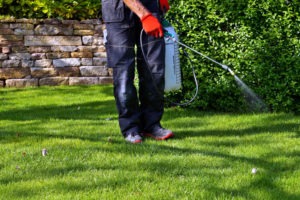Paraquat Weed Killer and Parkinson’s Disease: Let Us Guide You

In the personal injury field, some of the most unfortunate and devastating cases we handle are centered around workplace accidents and hazardous working conditions. Oftentimes these cases will involve workers who were unknowingly exposed to toxic chemicals, materials, or gases.
One of the most recent examples of this involves agricultural workers who have been diagnosed with Parkinson’s disease and other complications after being exposed to various herbicides that feature the weed killer known as paraquat. As a result, the product liability and workplace accident attorneys from Van Law Firm are currently pursuing paraquat cases, so that we may recover compensation for injured workers while also holding the chemical manufacturers accountable for the damage they’ve caused.
Origins of Paraquat and Brief History
For a free legal consultation, call (725) 900-9000
Paraquat is a liquid weed killer that has been in use by farmers and agricultural workers for over 50 years now. Workers prefer it for its effectiveness, as it starts killing weed cells immediately on contact and reduces the amount of time needed to clear large areas of land before planting new crops. It is typically sprayed directly onto desired areas either by hand or by a tractor.
Amazingly, the use of paraquat herbicides has actually increased in the U.S. over the last few years. According to the National Water-Quality Assessment (NAWQA) Project, in the ten-year span from 2006 to 2016, national paraquat usage more than doubled. The chief reason for this, ironically enough, is that a lot of workers have chosen to substitute paraquat for another high-profile weed killer that has also been shown to cause harm (RoundUp).
Click to contact our personal injury lawyers today
Dozens of other developed countries, including Brazil and China, have long since banned the use of these chemicals–no U.S. health agencies have officially banned or condemned paraquat use. In fact, as of October 2020, the Environment Protection Agency (EPA) reaffirmed that there is currently no need for a paraquat ban in the U.S.
Complete a Free Case Evaluation form now
This announcement came after their November 2019 mandate that required specific training and certification to be completed in order for workers to use paraquat herbicides. While this was a step in the right direction, tens of thousands of workers were already affected before this ruling was even put into place.
Paraquat’s Connections to Parkinson’s Disease
Parkinson’s disease is a chronic and progressive condition that has devastating effects on one’s neurological and muscular health. It is identified by constant muscle tremors and impaired movement, speech, and walking ability. The actual cause of Parkinson’s is unknown, and there is currently no cure nor even a proven effective treatment; indeed, a Parkinson’s diagnosis is truly some of the most unfortunate news one can receive.
Due to the puzzling nature of the disease itself, it’s hard to say exactly why paraquat and Parkinson’s have such a potent relationship. However, most experts believe that the chemical kills nerve cells in the brain, causing a slew of abnormal brain activity such as tremors and spasms. The weed killer is considered harmful if it is ingested, inhaled, or even contacted with workers’ skin. As you might suspect, that means that just about every worker who has used paraquat in the course of their duties is at risk.
Anyone experiencing any of the following symptoms should seek medical attention:
- Pain or inflammation in the mouth and throat area
- Stomach pain or discomfort
- Nausea or vomiting
- Scarring of the lungs
- Pulmonary edema
- Increased heart rate
- Respiratory failure
The first warnings about this correlation were published in a 2009 study in the American Journal of Epidemiology which posited that any exposure to paraquat within a 500-meter radius could increase the risk of Parkinson’s by up to 75 percent. Over the next decade, a multitude of other studies was published citing similar results.
These findings eventually led the Unified Parkinson’s Advocacy Council to send a petition to the EPA in July 2017 urging them to crack down on paraquat use. The agency subsequently imposed the aforementioned certification requirements in 2019.
Which Products and Manufacturers are Involved in Paraquat Suits?
At this point, potential claimants may be curious as to just what products and companies are responsible for their injuries. Paraquat lawsuits have named the following products and companies so far:
- Paraquat products include: Firestorm, Orth-Paraquat, Devour, Quick-Quat, Parazone, Blanco, Helmquat, and Para-SHOT.
- Paraquat manufacturers include : Chevron U.S.A, Inc., Growmark, and Syngenta.
Currently, paraquat litigation is still in its early stages, as COVID-19 brought sizable delays to all legal processes. In June 2021, MDL 3004 was created by the Judicial Panel for Multidistrict Litigation in an effort to consolidate a large number of paraquat-Parkinson’s lawsuits. The cases will now move forward in the discovery process. Claimants should note that paraquat is not in Roundup weed killers, and the two are entirely separate in terms of risks, effects, and litigation.
Contact Experienced Paraquat Attorneys
If you or someone you know is struggling with the effects of Parkinson’s disease after being exposed to paraquat weed killers, don’t hesitate to contact the trusted paraquat attorneys from Van Law Firm today for a free consultation and case evaluation.
Call our office nearest you now to see why we are one of the fastest-growing firms in the country. Don’t just take our word for it– with tens of millions recovered to this point and nearly 500 5-star reviews, our work speaks for itself.
No obligation consultations are always free.
Let Us Help You! Call Now: (725) 900-9000


